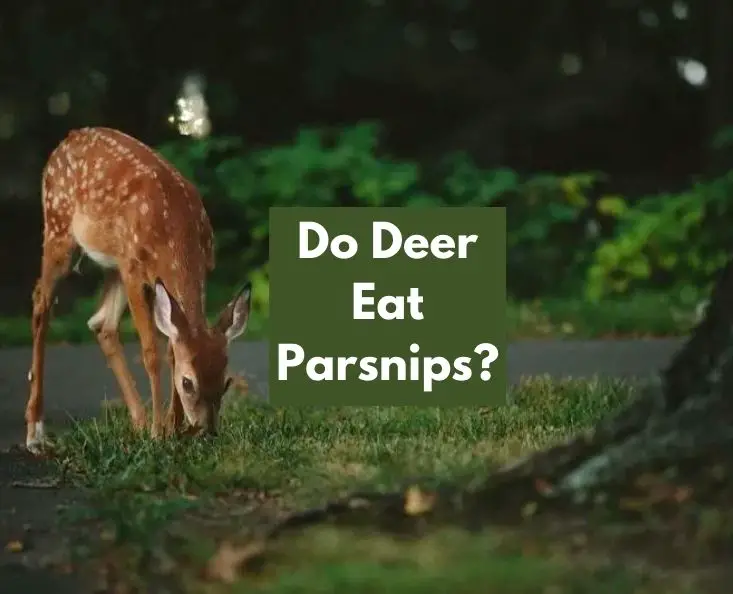There are a lot of myths out there about what deer do and do not eat. One common question is: do deer eat parsnips?
Yes, deer love to eat the parsnip taproot and the leafy green tops. Deer like eating tender greens and vegetables that are high in nutritional value, and parsnips check every box.
There’s a bit more to learn about deer eating parsnips which we’ll cover in today’s guide. Read on for more info.
Why Do Deer Eat Parsnips?
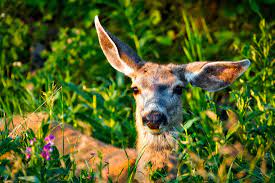
As we covered, deer will eat parsnips when they’ve got the chance.
But why do they do this?
Well, for one, deer are browsing animals, meaning they’ll eat almost anything they come across if they’re hungry enough.
They love leafy greens that are well-watered and fertilized, which makes parsnips a prime target for deer.
Your parsnips are most susceptible to deer when there are fewer other food choices around for them, and especially when the plants are young and the plants are tender.
They especially love winter parsnips because green foods are rare that time of year.
Additionally, deer will consume a wide variety of foods like parsnips based on opportunity.
If you’re not convinced, leave some parsnips out for deer to eat (or plant some), and wait to see what happens!
Are Parsnips Deer Resistant?
No, parsnips are not deer resistant at all.
Deer are attracted to parsnips because of the leafy greens, high water content, taste, and easy availability.
Do Deer Eat Parsnip Greens?
Deer love eating leafy greens like parsnip leaves and parsnip greens.
They’ll even eat the parsnip itself once they’ve chowed down on all the parsnip greens!
Planting Parsnips For Deer Food Plots
Many hunters plant parsnips in their food plots with a lot of success.
Ideally the deer in your area will already be used to having parsnips in their diet.
If not, hold off on introducing new foods like parsnips because they can interrupt their normal food search patterns and make them completely reliant on the beets as their new winter food source.
When Do Deer Start Eating Parsnips?
Deer will start eating parsnips as early as they germinate, but usually start hitting parsnips much harder between mid-October and throughout November.
How Do I Keep Deer From Eating My Parsnips?
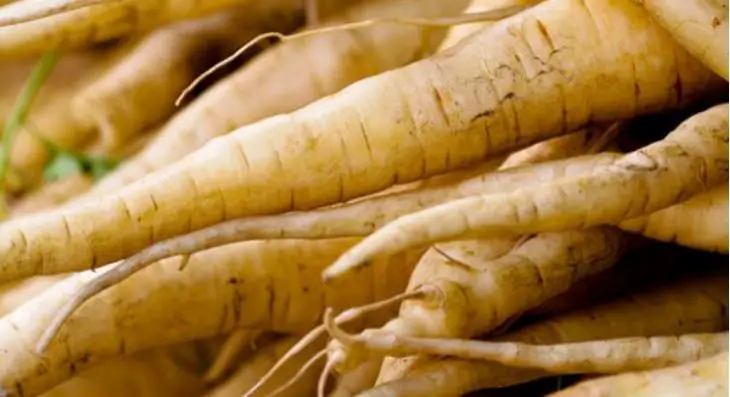
Most folks who want to know if deer like parsnips are trying to attract them to their area.
If you’re on the opposite side and want to keep deer away from your parsnip plants, this next section in our guide is for you.
There are a few things to keep in mind when you’re protecting parsnips from hungry deer: their habits, your scent, repellent options, and when you plant them.
Deer will eat nearly anything if they’re hungry enough, so your main goal is making your garden as least inviting to deer as possible.
Check out our guide on how to keep deer from eating plants where we cover 25 quick and easy tips for keeping hungry deer out of your garden.
Will My Parsnips Grow Back After Deer Eat Them?
So a hungry deer snuck in your garden and had a feast on your parsnips. Will they grow back?
Parsnips can handle some damage from deer, provided that it’s still got 1-2” left from the base of the plant.
Parsnips are a taproot, meaning that the main portion (the vegetable) as well as the root system is quite hardy.
Unless a deer rips the entire plant out of the ground, your parsnips should grow back with time.
Are Parsnips Good For Deer To Eat?
Parsnips contain highly digestible fiber, water, and a good bit of carbs and protein, so they attract deer easily.
Feeding deer parsnips and parsnip greens provides them with the following vitamins and minerals:
- Vitamins C & K
- Calcium
- Iron
- Potassium
- Magnesium
- Folate
- Phosphorous
These vitamins and minerals provide deer with many benefits.
For example, vitamin C will help protect deer against scurvy and vitamin assists in deer immune system function.
Deer need calcium for bone, teeth, and antler growth and health as well as other bodily functions like milk production and metabolism.
Potassium is great for deer because it helps maintain good pH balance and aid in proper digestion.
Magnesium is great for antler growth, increasing body weight, and has immune system benefits for deer.
Phosphorus also aids deer in body and antler growth.
Fat-Soluble Vitamins For Deer
Vitamins A, D, E, K, and calcium are fat-soluble, so they can be stored in the deer’s fat and liver to be used later as needed.
This means that calcium content from deer eating parsnips can be “stored up” for later use, which is highly beneficial.
Water-Soluble Vitamins For Deer
Vitamin C, B Vitamins, niacin, folic acid, and potassium are all water-soluble, which means they cannot be stored, so they must be replaced continually.
So a deer that eats parsnips for the vitamin C content must continue to consume foods that contain these necessary vitamins to stay healthy.
Can I Feed Parsnips To Deer?
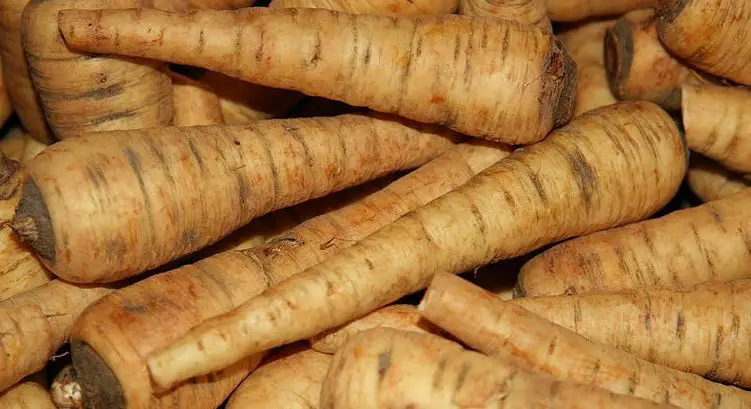
Feeding deer foods like parsnips occasionally is fine, as it is viewed as treat and the deer will really enjoy it!
Feeding wild deer parsnips regularly poses a few problems, however.
Here’s why you shouldn’t feed parsnips to deer often.
Deer Need To Rely On Nature For Food
If you feed deer continuously, they may start relying on that food source, which will cause them to stop foraging in nature for foods that they need to survive.
Natural Foods Are Naturally Better For Deer
Feeding deer foods like parsnips can alter their diet significantly, depending on what you’re feeding them, increasing the chance of malnourishment.
Deer Should Have A Healthy Fear Of Humans
Second, it reduces a deer’s natural fear of humans, which can shorten their lifespan or put them in danger.
You May Attract Other (Unwanted) Wildlife
Putting extra food out for deer can also attract predators like coyotes, wolves, or mountain lions to the area, which put the deer (and potentially you) at risk.
You Can Increase The Transmission Of Diseases
If you have lots of deer in your area, think twice about putting out food continuously for them.
If you bring deer together at the same feeding site, it can increase their risk of contracting chronic wasting disease or other communicable diseases from each other.
How To Feed Parsnips To Deer
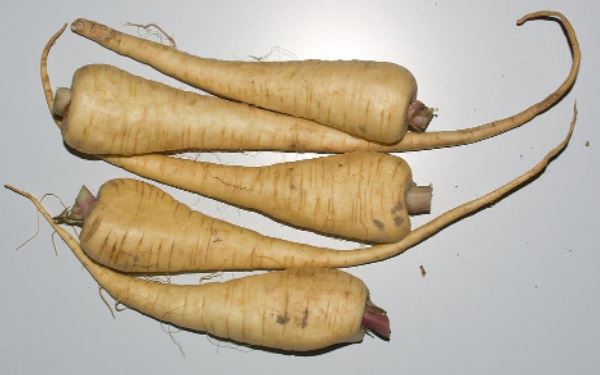
Most gardeners and veggie growers want to keep deer away from their parsnips.
If you have extra parsnips or are looking to see if you can feed parsnips to deer in your backyard, this next part is for you.
There are a few things to keep in mind when feeding deer parsnips: the size of the portion and your scent.
Make sure to place the parsnips on the ground where they’re visible and can be easily reached by deer.
If you’ve got a winter food plot with parsnips growing in it, the deer will eat them right out of the ground.
If deer are not normally around your area in winter, don’t feed them leading up to winter as they will not migrate where and when they should.
This will lead to the deer relying on you as their food source and can result in starvation.
Should I Cut Up Parsnips For Deer To Eat?
Deer are used to eating leafy greens like parsnips and the plant is also very tender, so you do not need to cut up or shred parsnips when feeding them to deer.
Don’t Leave Your Scent On Deer Food
Deer have a keen sense of smell that allows them to smell human scent farther than bloodhounds can, and can smell up to six different scents at once.
Deer won’t eat food like parsnips if they have a strong human scent on them, so you should take care to minimize your trace.
You can do this by rinsing the parsnips and also washing your hands with antimicrobial soap.
Alternatively, you can put a few drops of apple cider vinegar on your hands when handling food you’ll be giving to the deer.
Another easy option is to use gloves when handling parsnips for deer to eat.
Consider The Amount Of Deer You’re Feeding
If you have lots of deer in your area, think twice about putting out food continuously for them.
If you bring deer together at the same feeding site, it can increase their risk of contracting chronic wasting disease or other communicable diseases from each other.
Do Deer Eat Parsnips? Wrapping Things Up
So, do deer eat parsnips?
The answer is yes!
Deer absolutely love parsnips and will eat as many parsnips and parsnip greens as possible whenever they get the chance.
Deer will eat all leaves, greens, and roots of parsnips.
Fortunately there are many methods you can use and combine to keep deer away from your parsnips if you need to.
Try a few and see what works best for you.
Have any observations to add to the discussion? Be sure to let us know in the comments below.
Check our our other helpful wildlife guides while you’re here:
- Do deer eat lettuce?
- Do deer eat cabbage?
- Do deer eat asparagus?
- Do deer eat peas?
- Do deer eat rutabaga?
- Do deer eat pumpkins?
- Do deer eat tomatoes?
- Do deer eat pepper plants?
- Do deer horseradish plants?
- Do deer eat beets?
- Do deer eat green beans?
- Do deer eat sweet potatoes?
- Do deer eat carrots?
- Do deer eat squash?
- Do deer eat jalapeno plants?
- Do deer eat corn?
- Do deer eat radishes?
- Do deer eat zucchini?
- Do deer eat turnips?

